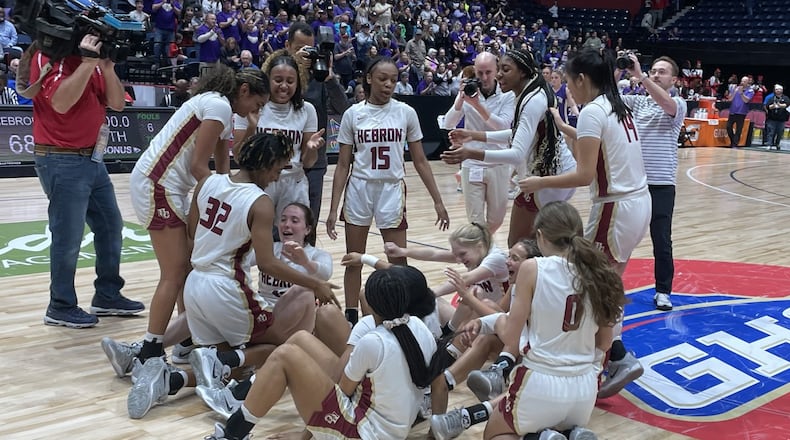Despite new rules designed to restrain them, private and city schools won more state championships this academic year than last, meaning the GHSA could be back to the drawing board when it reclassifies its 458 member schools this fall.
In a sports season that ended last week, the GHSA’s 46 private schools won 61 of the 187 titles; the 20 city schools won 17. In the previous year, private schools won 58, and city schools won 16.
The former Class A Private schools that were allowed to compete for state titles against public schools for the first time in a decade were especially successful under the new format, winning 37 championships compared with 17 when confined to their own classification in 2021-22.
In the end, private or city schools remained four times more likely to win a state title than a county school.
Jasper Jewell, a GHSA reclassification committee member and the athletic director of Atlanta Public Schools, predicted significant adjustments for the next reclass cycle, which would take effect in 2024-25.
“I think there will be some changes again to the multiplier as well as smaller privates going back to their own class,’’ Jewell said. “I don’t think they will be allowed to multiply out, but who knows. I am only one vote, one person.”
GHSA president Jim Finch said the reclass committee again would take a hard look at competitive balance among city, private and county schools.
“As always, reclassification is a very fluid situation, and conditions change from cycle to cycle,’’ he said. “Schools with larger percentages of out-of-zone students still continue to perform very well compared to schools with smaller OOZ students despite being vaulted up a classification or two. ... I anticipate much discussion about continuing to level the playing field.’’
The county schools’ argument is that private schools and city systems with one high school possess an unfair advantage because their attendance zones do not restrict who may attend.
In 2021, reclassification chairman Curt Miller, the athletic director at Oconee County, was so adamant for change that he endorsed putting all private schools in their own classification for state playoffs. The General Assembly even floated a bill in 2022 that would’ve made that law.
Appeasing most sides, the GHSA instead bumped up the out-of-zone enrollment multiplier to 3.0 from 2.0, meaning students not living in a school’s attendance zone would count three times when calculating a school’s enrollment for classification purposes.
The new rule effectively moved most city schools and larger private schools into higher classifications. City schools Buford and Carrollton went to the highest class for the first time this academic year, and private schools Blessed Trinity, Marist, Lovett and Greater Atlanta Christian moved up two classes.
The plan probably would’ve been deemed a success if not for the decision to abolish the public-private split in Class A. That last-minute resolution happened because 15 smaller private schools abruptly left the GHSA, most of them for the Georgia Independent School Association.
The exodus left the GHSA with only 37 Class A Private schools, just 25 that played football, not enough for the traditional 32-team playoff draw. Most GHSA classifications have more than 50 schools, and they’ll average 65 beginning in 2024 because the GHSA has resolved to eliminate one classification by then.
This year’s 3.0 multiplier did succeed in throttling the nine bigger private schools that played above Class A and had always competed against public schools. Those schools, which include all-sports powers Marist and Westminster, won only 24 state titles compared with 36 the year before. According to AJC research, they also advanced 31.5% fewer rounds in the 11 sports that have bracket playoffs in classes 7A through A.
The 20 city schools, which include Cartersville, Calhoun and Jefferson, didn’t advance as much in bracket play as the year before, although they still claimed one more state title.
But the 37 smaller private schools, set free to face public schools in classes 4A to A, cleaned up under the new rules. They advanced 375 rounds in the 11 bracket-playoff sports compared with 232 in 2021-22 – a 61.6% increase. Wesleyan, which moved from Class A Private into 3A, won seven state titles. Mount Paran Christian won five Class 2A championships.
Many reclass committee members contacted for this story said they needed more time to process the 2022-23 results and get the pulse of the membership before taking a strong position. Said committee chairman Miller, “We have not met to discuss anything, and I have not had a chance to dive into any reclass details just yet.’’
Miller said the first reclassification meeting likely would take place in late July or early August. That 17-member committee makes only recommendations. The GHSA’s executive committee representing the association’s 64 regions must ratify reclassification every other January.
A closer look at the numbers:
Beginning with the 2022-23 academic year, the GHSA classified its member schools based on their enrollment while counting out-of-zone students three times. In the previous two-year cycle, the GHSA counted out-of-zone students only twice. The intent of the 3.0 multiplier was to move schools with a high percentages of out-of-zone students into higher classifications. Those schools more likely would be private schools, which have no traditional school-district boundaries, and city schools, which typically allow students outside their school zones to attend. Here is a comparison of state championships won and rounds advanced in state playoffs the seasons before and after implementing the 3.0 multiplier and following the GHSA’s decision to abolish the Class A Private division, which left smaller private schools to compete against public schools for state titles for the first time since 2011-12. For simplicity and easy counting, the rounds advanced are limited to the 11 sports that have 32-team state playoff draws in all classifications. As such, they do not include golf or track and field but provide an objective sample to make quality comparisons. State championship data includes all sports.
CITY SCHOOLS
Number: 20 (Bremen, Buford, Calhoun, Carrollton, Cartersville, Commerce, Dalton, Decatur, Dublin, Gainesville, Gordon Lee, Jefferson, Marietta, Pelham, Rome, Social Circle, Thomasville, Trion, Valdosta, Vidalia)
State titles before/after: 16/17
Rounds advanced before/after: 217/165
LARGER PRIVATE SCHOOLS
Number: 9 (Benedictine, Blessed Trinity, Greater Atlanta Christian, Lovett, Marist, Pace Academy, St. Pius, Westminster, Woodward Academy)
State titles before/after: 41/24
Rounds advanced before/after: 222/152
SMALLER PRIVATE SCHOOLS
Number: 37 (Aquinas, Athens Academy, Athens Christian, Atlanta International, Ben Franklin Academy, Calvary Day, Christian Heritage, Darlington, Eagle’s Landing Christian, Excel Christian, Fellowship Christian, Galloway, Greenforest Christian, Hebron Christian, Holy Innocents’, King’s Ridge Christian, Landmark Christian, Mount Vernon, Mount Bethel Christian, Mount Paran Christian, Mount Pisgah Christian, North Cobb Christian, Paideia, Prince Avenue Christian, Providence Christian, Savannah Christian, Savannah Country Day, Southwest Atlanta Christian, St. Francis, St. Vincent’s Academy, Tallulah Falls, Trinity Christian, W.D. Mohammed, Walker, Weber, Wesleyan, Whitefield Academy)
State titles before/after: 17/37
Rounds advanced before/after: 232/375
COUNTY SCHOOLS*
Number: 392 (all others)
State titles before/after: 111/110
Rounds advanced before/after: 1,910/1,974
*Though it is a city system, Atlanta Public Schools is included because it has multiple high schools and is more similar to large county systems.
About the Author
The Latest
Featured

